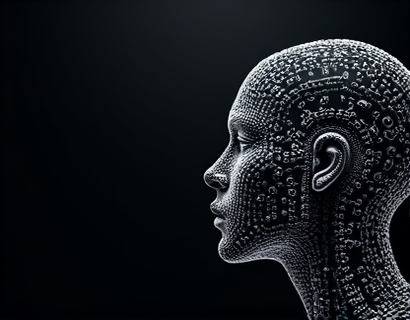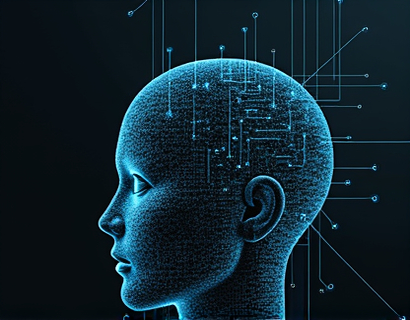Unlocking Next-Gen Engagement: Harnessing AI and Crypto for Digital Marketing Excellence
The digital marketing landscape is rapidly evolving, driven by technological advancements and changing consumer behaviors. To stay ahead, marketers must embrace innovative strategies that leverage the power of blockchain and artificial intelligence (AI). This article delves into the synergy between these two cutting-edge technologies, exploring how they can be harnessed to enhance user engagement and drive growth in the online environment. By understanding the potential of AI and crypto, marketers can unlock new avenues for creating interactive and seamless user experiences.
Understanding the Intersection of AI and Crypto
AI and blockchain technology, though distinct, share a common goal: to create more efficient, transparent, and user-centric systems. AI, with its ability to analyze vast amounts of data and learn from patterns, can significantly enhance marketing strategies. On the other hand, blockchain offers a decentralized, secure, and transparent way to manage transactions and data. When combined, these technologies can revolutionize digital marketing by providing robust solutions for data management, user interaction, and security.
Enhanced Data Management and Privacy
One of the primary benefits of integrating AI and blockchain in digital marketing is the improvement in data management and user privacy. Traditional marketing often struggles with data silos and privacy concerns, as user data is collected and stored in centralized databases, making it vulnerable to breaches. Blockchain technology addresses this by creating a decentralized data storage system where user data is encrypted and distributed across a network of nodes. This not only enhances security but also gives users more control over their data.
AI can further optimize this setup by analyzing data from various sources in real-time, providing insights without compromising user privacy. Machine learning algorithms can process anonymized data to identify trends, preferences, and behaviors, enabling marketers to create highly personalized and relevant content. This approach not only respects user privacy but also increases engagement by delivering tailored experiences.
Personalized User Experiences
Personalization is key to user engagement in the digital age. AI-driven algorithms can analyze user behavior, preferences, and interactions to create customized content and recommendations. When combined with blockchain, this process becomes even more robust. Blockchain ensures that user data is securely and transparently managed, allowing for more accurate and trustworthy personalization.
For instance, a content platform can use AI to analyze a user's reading history and preferences, then use blockchain to verify and reward content creators based on user engagement. This creates a virtuous cycle where users receive relevant content, creators are fairly compensated, and the platform enhances its offerings through continuous learning and improvement.
Incentivizing User Engagement
Traditional marketing often relies on generic incentives such as discounts and free trials to boost user engagement. However, these methods can be less effective in the long run. Blockchain and AI offer a more sophisticated approach by creating tokenized incentive systems. These systems use cryptocurrency tokens to reward users for specific actions, such as sharing content, completing surveys, or referring friends.
By leveraging smart contracts on the blockchain, these incentive programs can be automated and transparent, ensuring that rewards are distributed fairly and without intermediaries. AI can optimize these programs by analyzing user behavior and adjusting incentives in real-time to maximize engagement. This not only increases user participation but also fosters a loyal community around the platform.
Enhancing Content Authenticity and Trust
In an era where misinformation and fake news are rampant, building trust with users is crucial. Blockchain technology can play a significant role in verifying the authenticity of content. By using blockchain to timestamp and verify the origin of content, platforms can ensure that users are consuming genuine and reliable information.
AI can complement this by analyzing content for quality and relevance, flagging potential issues and suggesting improvements. This dual approach not only enhances content authenticity but also builds trust with users, leading to higher engagement and better brand reputation.
Decentralized Marketing Networks
Traditional marketing networks are often centralized, controlled by a few large players. This centralization can lead to inefficiencies and a lack of innovation. Blockchain enables the creation of decentralized marketing networks where multiple stakeholders, including brands, advertisers, and users, can interact directly. These networks can facilitate peer-to-peer advertising, content creation, and distribution, reducing costs and increasing transparency.
AI can optimize these networks by analyzing data from various nodes to identify the most effective marketing strategies and allocate resources efficiently. For example, an AI-driven platform can match brands with the most relevant influencers based on user data and engagement metrics, ensuring that marketing efforts are targeted and impactful.
Real-World Applications and Case Studies
Several platforms and projects are already leveraging the combination of AI and blockchain to enhance digital marketing. One notable example is a decentralized social media platform that uses blockchain to give users ownership of their data and content. AI algorithms curate personalized feeds based on user preferences, while blockchain ensures data privacy and fair compensation for content creators.
Another case is an e-commerce platform that uses AI to predict consumer trends and blockchain to secure transactions and verify product authenticity. This combination not only improves user experience but also builds trust and loyalty among customers.
Challenges and Considerations
While the potential of AI and blockchain in digital marketing is vast, there are several challenges and considerations to keep in mind. One major challenge is the technical complexity involved in integrating these technologies. Marketers and developers need to have a solid understanding of both AI algorithms and blockchain mechanics to implement them effectively.
Another consideration is the regulatory landscape. As blockchain and cryptocurrency are still relatively new, regulations vary widely across different regions. Marketers must ensure compliance with local laws and regulations to avoid legal issues. Additionally, there is a need for education and awareness among users regarding the benefits and risks associated with these technologies.
Future Trends and Opportunities
The integration of AI and blockchain in digital marketing is just beginning, and the future holds numerous exciting opportunities. As these technologies continue to mature, we can expect more sophisticated and seamless user experiences. For instance, the rise of Web3 and decentralized applications (dApps) will further blur the lines between traditional and digital marketing, creating new paradigms for user interaction and engagement.
Marketers who embrace these trends and invest in building AI and blockchain capabilities will be well-positioned to lead the next generation of digital marketing. By focusing on innovation, transparency, and user-centricity, they can unlock new levels of engagement and drive sustainable growth in the online landscape.










































